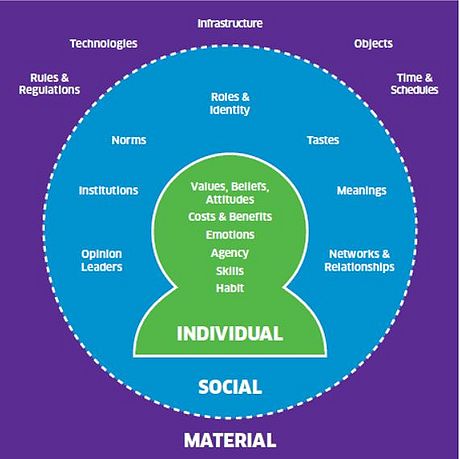ISM Principles of Change
| Line 8: | Line 8: | ||
<div><ul> | <div><ul> | ||
| − | [[File:ISM.jpg|thumb|none| | + | [[File:ISM.jpg|thumb|none|460px|The ISM - Individual, Social, and Material - model. A technical model to understand and influence behaviours [Scotgov.].]] |
</ul></div> | </ul></div> | ||
Revision as of 23:53, 14 February 2021
The ISM - Individual, Social, and Material - model is a multi-disciplinary tool to study the human behavior in the aspects of: behavioral economics, social psychology and sociology [GovScot.]. The model facilitates an integrated, whole-system perspective of the challenges of individuals, organizations, and partnerships. Through the process, stakeholders aim to develop a shared understanding by identifying their respective roles in bringing about change. Hereby, the model draws insight from multiple disciplines to ease the decision-making of complex problems [sustain.]. The result is a shared ownership of solutions. This is a vital part of programme management to successfully transferring ownership to operations in all kind of projects [PMI].
The ISM tool was developed by researcher Andrew Darnton and launched by the Scottish Government in 2013 to evaluate the impact of sustainability challenges in interrelated projects [ISM]. Since, it has found use for policy makers and practitioners to influence people's behaviors and bring about change [Govscot.]. The combination of theoritical and practical aspects of ISM is suited to design or improve programmes, which are utilized in many cases such as waste management, lower carbon emissions, and policy processes [slidsha].
Contents |
Background
x
The Three Aspects
x
Usage
x
Limitations
x
References
It fosters identification and development of options and shared ownership of solutions, taking account of influences on behaviors and decision-making which ultimately determine the impact of projects and actions.
Further readings: Behavioral economics: Nudge, R. H. Thaler. Social psychology: Influence Science and Practice, R. B. Cialdini. Sociology: The dynamics of social practice, E. Shove.
